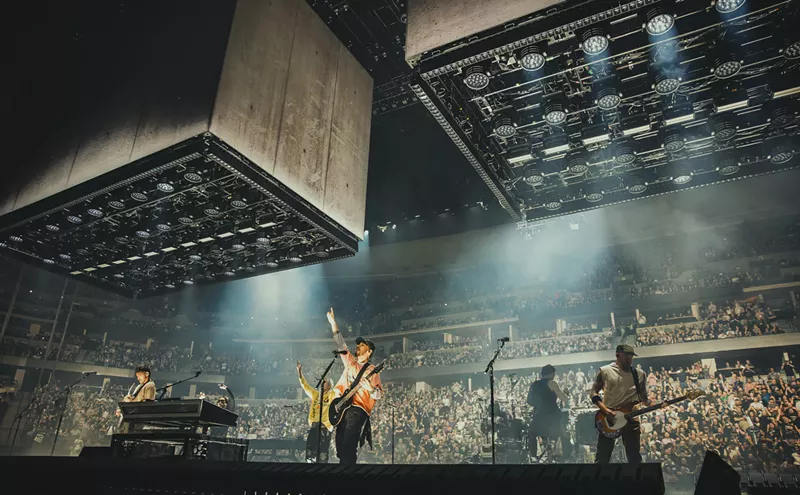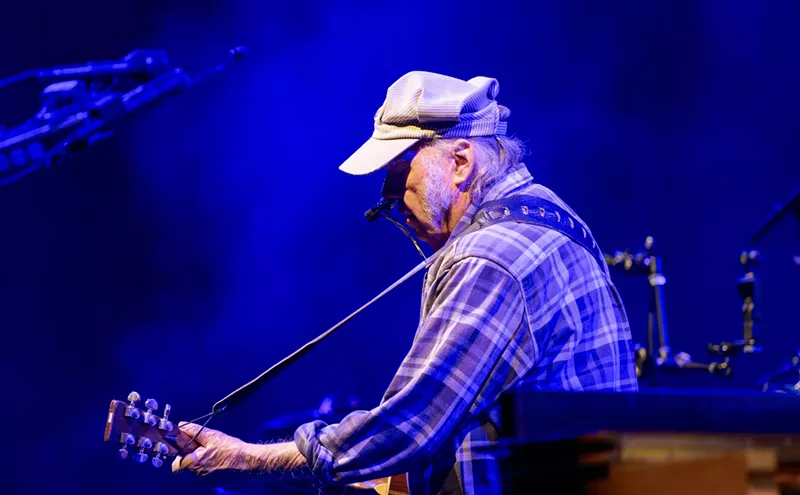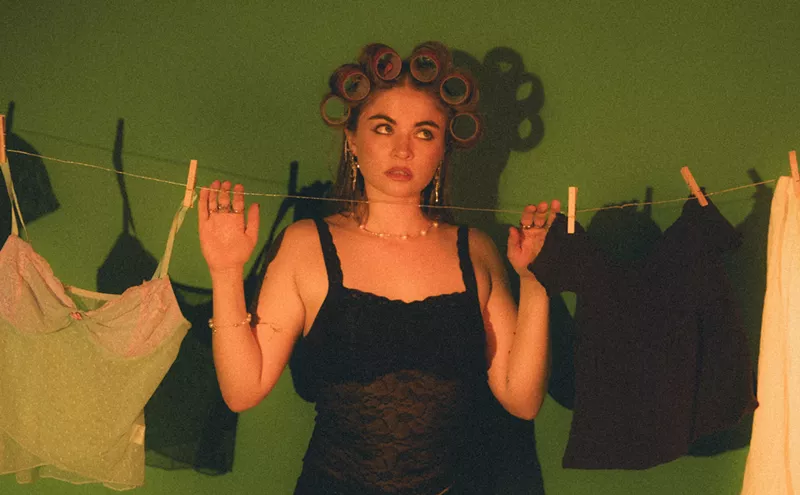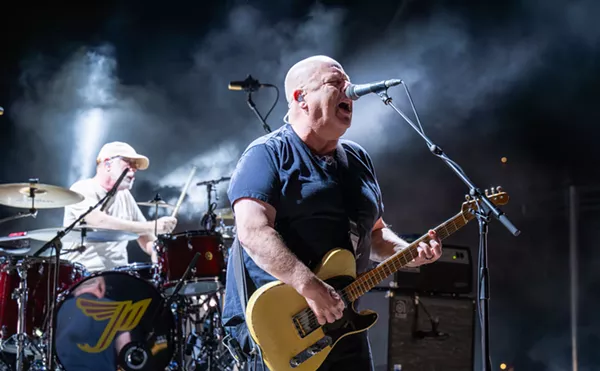Earth was one of the first bands to explore the inner spaces of drone and doom metal. In its earlier phase, Earth made creative use of distortion to create dense and crushing atmospheres. Since the band regrouped close to a decade ago, the focus has been more on a textured yet musical ambient sound created using conventional rock instruments to stir the heart and imagination without resorting to blunt sonic manipulations.
See also: - Tonight: Earth at the Marquis Theater, 11/21/12 - The ten best concerts this week: Nov. 19-23
Earth's latest record, Angels of Darkness, Demons of Light I and II feels like meditative psychedelic rock music that would be a fine companion to fantasy literature like Gene Wolfe's The Book of the New Sun series or the weird tales of Clark Ashton Smith. It's the sort of thing to suggest otherworldly with evolving, purely sonic narratives. We recently spoke with band's long time leader, the thoughtful and affable Dylan Carlson about the origin of the band, his collaborators, older and newer, how British fairy tales made an impact on his most recent music and why he prefers a slow pace to his songs.
Westword: You started the band in 1989 in Olympia. What made it attractive or easier to start the band there? Was it more a function of where you happened to be living at the time.
Dylan Carlson: I had lived in Olympia before then. I moved there right out of high school, mainly because I was good friends with Slim Moon at the time. He said, "You should come to Olympia." It was obviously less expensive than Seattle, and I moved there and moved back. I had moved down to date somebody, and that happened again, so it was those kinds of decisions.
At that time what kind of cultural and musical climate existed in Olympia during the early days of the band?
Obviously the K [Records] thing was going. It was kind of like Olympia had certain little scenes that were like the young pioneers and the older group of people and then the K people. There was a band that did the metal shows at the college, the hippie band, and then there were the punk rock kids. It was all small little groups, but there was only one place to play, this place called GESCO. Even though everyone was in their own little groups, everyone went to the same shows and all of that. I think it was a much more open town. It seems like a much darker place now when you go there with all the drugs and street kids. That really wasn't there then.
Obviously, in a small town there isn't a lot to do, so you start doing stuff for yourself kind of thing. Although we did get bands playing there quite a bit because of the GESCO place, especially the Melvins would play there a lot. The bands from Seattle would come down. Back then, I don't know what they called it, the American independent scene, American hardcore scene, whatever history has dubbed it, those bands would come through on their way from Portland or on the way between Portland and Seattle.
Early on, Joe Preston was part of the band. How did you meet Joe, and what do you appreciate about his particular sensibility?
I met him through Mike Johnson. They were in a band together called Snakepit. Snakepit came through town and stayed at our place; that's when I first met him. That was right about the time that Snakepit broke up and they left Eugene, [Oregon]. We had the Melvins in common, and he got a job at the same record store we all worked at. He wasn't really doing anything after Snakepit, so I asked him, "Do you want to play with Earth." Obviously his dream was to join the Melvins, and he was sort of biding his time, and when that didn't quite work out, initially, he became bitter and moved on. That's the last I've heard from him. He was a good bass player, though.
You took a bit of a break from Earth for several years for what one could call unfortunate personal reasons. What brought you back to playing that kind of music?
I went to L.A. in '97 and came back to Seattle in 2000. I hadn't played guitar or had a guitar in a while. I mostly just wanted to get a guitar to play again because I liked playing. It was more for personal reasons. Adrienne [Davies] had a drum set, so we just started playing just to play. I didn't have any plans of doing Earth or doing it professionally again.
I was working at a picture framer [shop], and I did an interview with Stonerrock.com or Doomrock.com -- I can't remember which -- and I talked about where I worked. The guy knew where the shop was, and him and Randall Dunn showed up and these two guys walked in and went, "Oh, are you Dylan?" I asked, "Who wants to know?" Then they asked if I wanted to do an Earth show. I said I had been playing again but didn't know if it's Earth. But "I guess we can run it up the flagpole and see what happens."
We decided there were enough similarities to the original thing. Obviously the repetition and the length of the songs. That first stuff was definitely more a product of the therapy rock era because it was skronky and improv-y as well as repetitive. It just started rolling from there. There were reissues and that guy did Living in the Gleam of an Unsheathed Sword.
In 2003 I met Greg [Anderson] in L.A., and when I was living down there, he invited me to a Goatsnake show. He invited us to play a showcase he was doing in SXSW. After we played that he approached me to do the new Earth thing. Everyone else that approached us wanted to do some new stuff but mostly they wanted to reissue stuff.
Then we did Hex; [Or Printing in the Infernal Method], and it's been rolling ever since. I guess it wasn't intentional to restart it. Like many things it just sort of happened. I don't have a master plan, contrary to what some people may think.
Probably this has changed a long time ago, but do you still use Sunn amps?
No, I don't. It's funny because the one I used was actually a solid state model, not a tube model. It was a Sunn Beta Lead, which Buzz from the Melvins used, and that's how I heard about them. Basically because Sunn amps were made in Puyallup, Oregon. At the time, there were a ton of them everywhere, and they were dirt cheap. No one wanted them, especially the solid state ones.
What do you use now?
I went through a real freak phase, especially up through [The Bees Made Honey in the Lion's Skull]. But now I'm not particularly finicky. I seem to be able to do what I need to do regardless [of something that specific]. Usually on tour, I'm using, if we're running a backline, a Fender Deluxe Reverb or a Twin Reverb.
This tour, I'm using this old VHT head, this six watt head, sort of half a Deluxe, I guess. Then I have a 1X15 cab. I've also used solid state heads, something built as a bass head. Then I used a Crate Power Block solid state heads on a few tours. At home, I have an old Mesa Mark IV that I use. On Bees, I had Fender Vibroverb reissue that I used. But I'm not particularly finicky equipment-wise.
On tour, I try to use the least expensive pedals I can just in case they're stolen or break down. There was one pedal I use, the MXR Dyna Comp -- if I could have only one pedal, that would be it. I sometimes use a [Boss] Blues Driver. Then some kind of wobbly thing, either a Phase 45 or an MXR Micro Chorus. I have some other stuff, but I usually don't take that stuff on tour, like some older stuff, like the Sunface Germanium Fuzz, Prescription Electronics Univibe. I don't take those out because I don't want to lose them, or they're too big to lug around.
On the last tour, the people at this company called Dwarfcraft gave me this pedal called Eau Claire Thunder that I use -- it's kind of a distortion with a feedback loop. That makes some cool stuff. On the solo tour, I just completed in U.K. and Ireland, a guy gave me a pedal from this company called Moog 23. It's basically a Tubescreamer clone, but it has the higher mid boost and more of the low mids.
Then the bass is padded out a little more. Then it has a switch for asymmetrical clipping. That one's over in England though because I have my solo rig, which is a little one watt Marshall Mini Bluesbreaker. I have another rig in Amsterdam for the U.K. and EU tours. And I just left a guitar in Japan, so I guess next time I go to Japan I'll be using that one. I'm building little things in different places so I don't have to carry stuff with me.
Guitar-wise, I love Teles the best or Strats. I don't play particularly fancy guitars. The Strat's a Squier. I mean I've never bought a guitar over six hundred dollars because I always change pickups and put brass nuts on it and stuff. I've always thought if you're going to spend the bulk of your money, spend it on the amp and not on the guitar. There's not that much difference between an expensive guitar and an inexpensive guitar in electrics. With acoustics, it's a different story.
But with the electric guitar, it's the amps and the pickups that make the difference. I prefer the Fender style for touring. I like the longer scale length and the full, thin, neck. Everyone I know that has the Gibson style stuff, the headstocks break. One time I tried to take an SG out, and it crapped out electronically during soundcheck, so I had to run next door and buy a hundred fifty Squier Tele to finish the tour with it. It seems that Fenders can take it. They were originally built for the road. With gear now I [take the attitude] more of whatever gets the job done and if it's easy to load. I've always been and still am my own road crew.
Why was Blood Meridian such an inspiration for Bees or maybe Cormac McCarthy in general?
About the time before we did Hex, I was going back, as I usually do, through my records and finding something I could get excited with it again or get obsessed with it. At that time, it was this country thing. I had just come back to playing guitar and decided I really wanted a Tele and became obsessed with Teles. I had some friends who had read some of his other stuff, his Southern Gothic stuff, which I wasn't into to so much. A friend recommended the novel to me.
At the same time I was reading another book, [whose title escapes me at the moment], that was sort of talking about how the American continent, the physical landscape, was evil, for a lack of a better term. I guess that book dovetailed nicely with Blood Meridian. I've always also been a history buff, so the fact that the historical documents he based the book on, I've always found that era interesting. It has such powerful imagery and writing.
I don't like everything he's written, just that one and the Border Trilogy, rather than his earlier Falknerian work. It was sort of envisioned as a soundtrack for that whether a film of the book, although I doubt anyone would have the ability to make that movie. Kind of like the Neil Young soundtrack for Dead Man: I thought, "Oh, what if there were a soundtrack for Blood Meridian?"
You have talked about Fairport Convention in that interview on your website with your cellist, Lori Goldston. Specifically how they write tragedy in a major key. How has their music impacted what you've done?
I've always liked darker stuff done that way because it's not maudlin. "Oh, it's a sad song in a minor key" -- that sounds kind of obvious and schmaltzy. They're coming out of the folk thing, the modal playing, I like that sort of suspended feel that they have as well. My goal, whether I achieve it or not is up to other people, is to create music that's timeless.
Even though its new music, there's that thing that makes it sounds familiar like a pastiche, but "I don't know this song but it seems like it's always existed." It doesn't fade with time. That's why I like the English folk rock bands where they'll do a really old song or a newer song and it doesn't date. Unlike, say, a protest song about this or that. To me, that stuff becomes dated as soon as it's done.
That sort of topical folk song thing or any kind of topical, political song becomes so dated quickly. Then you can think of songs that don't like "Fortunate Son" by Credence Clearwater Revival -- that's just a great song all the way around, and it applies all the time rather than being specific. They managed to transcend that trap of being dated immediately.
It's like the idea of a lullaby; the idea's been around forever. Trying to do a melody that's numinous and seems so familiar but makes you realize that maybe you have never heard it. Rather than making something that's the latest style or about this or that right now, I think music can communicate so much information without having to make it that specific. I think when you make it that specific you're limiting your, I don't know what to call it, shelf life.
How did you meet Karl Blau, and what do you think he brings to what you're doing?
I met Karl through our manager, Clyde Petersen. He was playing drums with Clyde's project Your Heart Breaks. I had a couple of his albums and I just think he's an amazing and talented person. Originally we had talked about recording the album with him as an engineer. That didn't happen, and we had already a two week tour with that line-up.
We just really liked what he did as a bassist. He really gelled with the line-up. We ended up not using him in his producer and engineer capacity. Unfortunately, we're not touring with him or Lori because both of them have children. After the European tour, Lori decided she didn't want to tour anymore or not the rock band kind of tour anymore. Karl also has so much going on with his solo stuff. Who knows?
In the future, either might play with us again. The door is always open for either of them. When I tour, I tend to hit it hard with long tours where we try to play every night. That can wear on people. We're touring again with Don McGreevy and Steve Moore from the Bees line-up. The eastern tour of New Zealand, Australia and Japan we did as a trio with me, Adrienne and Steve.
You recorded both parts of Angels of Darkness, Demons of Light at the same time. Have you had the time to work on anything new since then?
We've got about five new songs. We've been doing two or three depending on if there's on encore on this tour. Although two of them we sort of segue with stuff off Angels. Probably next year sometime we'll be recording a new Earth record. This year it's been a lot of touring and I've been doing solo stuff as well. I did a solo tour of the UK in October and as soon as I got home we went on the Earth tour.
For Angels, perhaps this was mentioned in The Skinny out of the U.K., you had been into reading Welsh, English and Irish fairy tale stories. What is it about that stuff that kind of inspired you?
I come from mostly Scotch English descent. My grandmother came over after the war, and she married my grandpa. She used to tell us stories. My grandfather when he was over there during the war, had had sort of an encounter with one of those "white ladies," a death omen, so that's probably where my interest originated.
I've always been into history, like I said, and too much heavy metal and fantasy literature. Obviously I'm more interested in the historical side of it, the serious side of it, but I've always been attracted to that kind of stuff for whatever reason. It's sort of a genetic predisposition. A friend of mine introduced me to this Scottish music that they call "the high music," and rather than being the dance tunes and stuff like that, it's all songs about battles and chieftains and that sort of thing.
But it's interesting because it's all much longer pieces than the, for lack of a better term, party music. It's slower and it's interesting because there's the drone of the bagpipes and they repeat the same figure melodically for a long time before introducing subtle variations. It's very Earth-like in that way. Or Earth is very like that in that way.
I realize that I've written this more theme and variation thing rather than verse-chorus-verse-chorus. I do a riff and a variation of the riff and stuff like that. So it was interesting to hear stuff like that. I've always, for some reason, liked drones and music played against this static background. So I guess there is a genetic link.
There's a song called "Sigil of Brass" on Angels II that resonates with pre-Islamic folk stories and legends from the Middle East. Was that something you'd been reading as well?
Yeah, I've always admired Sir Richard Burton's translation of Arabian Nights and all of that. Then being interested in mysticism and religion. Also in English occult practice they had what they called lamin, which was the piece of metal that they wore with the sigil on it for summoning what they called "treasure spirits."
I generally try to assign titles that have a certain resonance and multiple interpretations, I guess, all along a certain path. That's what I find interesting about music. With words you have to really be careful to find stuff like that that resonates like that whereas music seems to automatically communicate on a number of different levels. Whereas with language it seems more difficult to hit that resonance.
What about the slow pace of your music allows you to express better?
I don't know why I've always gravitate to music that's slower. Not exclusively but it's always appealed to me more. I just like music with a lot of space. I've always liked music with subtle dynamics. In the 90s there was that whole soft-loud thing and I found that really annoying because there's a whole bunch of other ways to do dynamics. That's what I always really liked about The Grateful Dead. There's peaks and valleys and they're don't go, "Here's quiet part, here's the loud part." You can just feel when the band links up and is really hitting it or if they go off.
In jazz or in R&B or country, there are those pregnant pauses and the space between the notes is just as important. I find that sometimes by restricting the amount of material you have allows you to focus and work that material more rather than trying to do as many notes as possible, as fast as possible.
When I was starting Earth, it was the time, and right before that, it was that period where everyone was trying to be as fast as possible. When that happens then it sort of reduces music to an athletic event rather than, you know, music. Then obviously the opposite has happened and now there's bands that are, "Oh, we're the slowest band of all of time. We're slower than them. We're so slow." Whoopty doo. Whatever. Is it listenable? Is it good? You know what I mean? It's funny when these non-musical criteria become the be all and end all of the project and that just doesn't really make sense.
Follow @Westword_Music










